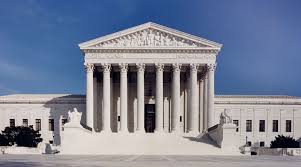
The U.S. Supreme Court issued several rulings that will directly impact people who experience sexual and domestic violence and take on special meaning as we collectively rise up and awaken to the demands of the Movement for Black Lives. We must acknowledge that the foundation that paved the path especially for the Title VII decision described below was laid by the arduous organizing of black and brown people who fought for the Civil Rights Act of 1964 and the generations of LGBTQ+ POC elders and ancestors who put their hearts and bodies at the forefront of the struggle. LGBTQ+ liberation is directly tied to the liberation of Black and Brown people.
Title VII of the Civil Rights Act of 1964 protects individuals from being fired due to their sexual orientation or gender identity!
Did you know that a majority of Americans believed that federal law already prohibited discrimination against LGBTQ+ individuals in employment? Until this week, this was false! States varied widely with protections available to LGBTQ+ people, and like the three brave employees in cases that made their way to the US Supreme Court, one could very well find themselves out of job because of their sexual orientation and/or gender identity.
In a landmark decision, on June 15, 2020, the Court ruled in R.G. & G.R. Harris Funeral Homes Inc. v. Equal Employment Opportunity Commission and Altitude Express Inc. v. Zarda & Bostock v. Clayton County, Georgia that an employer who fires an individual merely for being LGBTQ+ violates Title VII of the Civil Rights Act of 1964. For the first time, this decision affirms that it is unlawful to fire workers for their gender identity and/or sexual orientation. To check out protections available to LGBTQ+ individuals across the country, visit https://www.lgbtmap.org/.
This is the first time the Supreme Court of the United States has considered the civil rights of transgender individuals. We win when we center the experiences and leadership of those who are living at the intersection of oppression. Let us remember that Aimee Australia Stephens was the first trans person to stand before SCOTUS in her truth. Aimee passed away on May 12, 2020, just over a month before this historic decision. May she rest in power. Aimee was represented by trans attorneys Chase Strangio and Gabriel Arkles. #RepresentationMatters.
#HomeIsHere!
Today the Supreme Court of the United States stood with undocumented immigrants in their decision to uphold the Deferred Action for Childhood Arrivals program (DACA). DACA provides a lifeline for hundreds of thousands of undocumented individuals who arrived in the US as children. DACA recipients have the right to live and work in in the US without threat of deportation. Stable immigration status reduces vulnerability to domestic and sexual violence and exploitation and creates pathways to additional support for thousands of immigrant survivors of SDV. We celebrate the Court’s decision today and we also remain vigilant and dedicated to protecting immigrant communities. In Massachusetts, we must continue our urgent call to action to our legislators to pass the #SafeCommunitiesAct. Justice and dignity for immigrants can’t wait. For more information on the impact of this case, check out: https://unitedwedream.org/live-webinars-the-supreme-courts-decision-on-daca/.
Other Supreme Court Updates
In other news from the Court, the justices declined to hear a case on whether local governments can declare themselves sanctuaries and refuse to help federal agents enforce immigration laws. The Courts refusal to hear this case means the California law that bars police departments and sheriff’s offices from notifying federal agents when immigrants are about to be released after serving sentences for local crimes will remain standing. This is a victory!
The Court also declined to hear a host of gun rights cases that challenge state laws placing restrictions on firearms. This decision means that laws from several states will remain intact, including a Massachusetts ban on some semi-automatic firearms and large-capacity ammunition magazine. The Court also declined to hear eight cases involving qualified immunity defense. This decision is noteworthy in light of the current public spotlight on qualified immunity and police brutality. JDI will continue to closely monitor these important conversations taking place.
